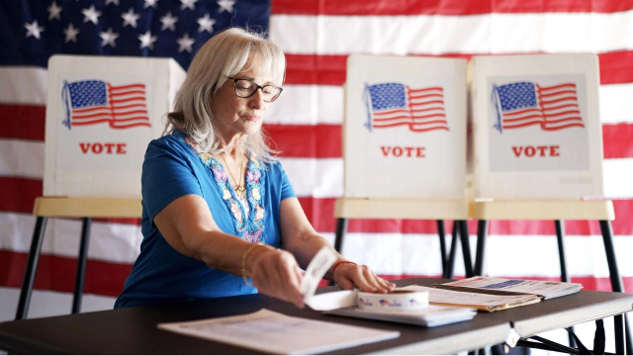
In This Article
- Is the 2026 election already being manipulated?
- What new tactics is the DOJ using to collect voter data?
- How are state officials responding to federal overreach?
- What do past tactics tell us about the current threat?
- Could a national voter file be used to suppress votes?
How Trump Is Targeting the 2026 Election
by Robert Jennings, InnerSelf.comAfter January 6, many Americans breathed a premature sigh of relief. The insurrection failed, the ballots were eventually certified, and the so-called guardrails of democracy appeared to hold. The riot was grotesque, yes—but it was also theatrical, chaotic, and unmistakably visible. To many, it looked like the final spasm of a losing side. The belief took hold that the worst was over, that Trumpism had reached its climax and collapsed under the weight of its own absurdity.
But what if that spectacle was just Act I? What if the real threat didn’t come in camo gear, waving flags, but in suits quietly drafting executive orders? We’re no longer dealing with mobs in the street; we’re facing memos from the Department of Justice. Forget gallows on the Capitol lawn—this version of the coup is quieter, more technical, and far more dangerous. It operates behind the scenes, cloaked in the rhetoric of “election integrity,” while systematically centralizing power over the electoral process itself. This isn’t chaos. It’s control.
Voter Data as a Weapon
The Trump administration, under the pretext of cleaning up voter rolls, has sent sweeping requests to at least nine states asking for personal voter data. These aren't casual FOIA requests. These are data grabs: names, addresses, voting history—possibly even fragments of Social Security numbers. Two states, including Florida, have already turned over partial data. The rest? Reviewing. Stalling. Hoping no one notices.
Make no mistake: the plan is not just about “cleaning up” rolls. It's about laying the groundwork for a centralized federal voter file. A shadow system that could flag voters as suspicious, challenge eligibility en masse, or purge entire demographics—all under the veil of legality.
New Tools, Old Playbook
This is the same strategy used in 2020, but refined and updated. Back then, it was rogue county clerks, mysterious USB drives, and Rudy Giuliani's traveling circus. Now it’s institutionalized. Now it’s Jeff Small, a former Boebert staffer, cold-calling Colorado election clerks on behalf of “the White House,” asking for access to inspect voting machines. Yes, *inspect*. As in: let's go to the back room, poke around the servers, and maybe clone a hard drive or two. For security, of course.
Even Republican clerks—who voted for Trump—are slamming the brakes. Justin Grantham in Fremont County, Colorado, said no. Carly Koppes in Weld County called it a “hard stop.” These aren’t leftists; they’re conservatives alarmed at the idea of federal agents—or worse, unvetted third parties—tampering with secure machines ahead of an election.
Let’s Not Pretend This Is Normal
The Justice Department has no constitutional authority to demand this level of access to state-run elections. The Constitution gave that power to the states for a reason: to prevent precisely this kind of centralized abuse. Even during Bush v. Gore, as messy as it was, there was no national database, no coordinated federal pressure campaign. This is new—and chilling.
We’ve seen this tactic before, just not in the U.S. Think Hungary. Think Russia. First, you flood the zone with lies about “fraud.” Then, you demand access to fix it. Then, you rig the process while claiming to clean it up. Rinse and repeat. By the time voters catch on, the next election is already locked down.
The Evolving Playbook: Old Suppression, New Tricks
Old voter suppression was crude: poll taxes, literacy tests, and purging Black voters. The new model is slicker. It's all data, legality, and language games. Voter ID laws remain in effect. Gerrymandering still works its dark magic. However, we now add algorithms, machine audits, and “citizenship verification” schemes, designed to sound reasonable but function like voter filters.
And let’s not forget what they’re doing in the courts. Trump’s executive order to take control of mail ballot deadlines and demand proof of citizenship is already tied up in litigation. But they’re still enforcing the parts that weren’t blocked. That’s the strategy: pass a monstrosity, let the courts carve it up, and then exploit the scraps.
Resistance Across Party Lines
What’s shocking isn’t just the power grab—it’s who’s resisting. This time, it's not just Democrats waving red flags. Republican clerks, conservative legal experts, and officials from red states are alarmed. Some remember what happened when Trump tried this in 2017, demanding voter data for his election “commission.” Most states told him to take a hike. Mississippi’s GOP Secretary of State famously told the feds to “go jump in the Gulf of Mexico.”
Now, they’re doing it again—but it’s more sophisticated. And they’ve learned from the blowback. This time it’s not commissions—it’s executive orders and agency letters. And when election clerks refuse access, they’re followed up by “consultants” and “task forces” from Homeland Security. Yes, DHS. Because apparently democracy is now a matter of national security—if the president says so.
Building the Database of Control
The big picture is horrifying. If the DOJ succeeds in creating a centralized voter database, it could include personal details on all 174 million registered voters. One hack, and it’s a data leak of historic proportions. One policy shift, and it becomes a tool for purging inconvenient voters. It’s not hard to imagine a future where voting itself becomes conditional on paperwork, citizenship checks, or algorithmic “trust” scores.
This isn’t science fiction. It’s public policy in motion. As Loyola law professor Justin Levitt said, this kind of request is “exceptionally unusual” and probably illegal. But illegality hasn’t stopped this administration before. And suppose they get away with it now. In that case, it sets a precedent for Democrats or any future administration to follow suit.
When Quiet Coups Replace Loud Riots
We’re taught to think democracy dies with a bang. But what if it dies with a spreadsheet? What if the last fair election wasn’t stolen with violence, but with a signed letter from the DOJ requesting voter rolls “for review”? That’s the real danger—when corruption wears a tie and speaks legalese.
So here’s the question: Are we watching the theft of the 2026 election in real time? If we are, then silence is complicity. The real patriots right now are the clerks saying no. The journalists are sounding alarms. And the citizens are refusing to let democracy bleed out in slow motion.
About the Author
 Robert Jennings is the co-publisher of InnerSelf.com, a platform dedicated to empowering individuals and fostering a more connected, equitable world. A veteran of the U.S. Marine Corps and the U.S. Army, Robert draws on his diverse life experiences, from working in real estate and construction to building InnerSelf with his wife, Marie T. Russell, to bring a practical, grounded perspective to life’s challenges. Founded in 1996, InnerSelf.com shares insights to help people make informed, meaningful choices for themselves and the planet. More than 30 years later, InnerSelf continues to inspire clarity and empowerment.
Robert Jennings is the co-publisher of InnerSelf.com, a platform dedicated to empowering individuals and fostering a more connected, equitable world. A veteran of the U.S. Marine Corps and the U.S. Army, Robert draws on his diverse life experiences, from working in real estate and construction to building InnerSelf with his wife, Marie T. Russell, to bring a practical, grounded perspective to life’s challenges. Founded in 1996, InnerSelf.com shares insights to help people make informed, meaningful choices for themselves and the planet. More than 30 years later, InnerSelf continues to inspire clarity and empowerment.
Creative Commons 4.0
This article is licensed under a Creative Commons Attribution-Share Alike 4.0 License. Attribute the author Robert Jennings, InnerSelf.com. Link back to the article This article originally appeared on InnerSelf.com
Article Recap
The Trump administration is already executing tactics to influence the 2026 election—collecting voter data, inspecting machines, and sidestepping constitutional limits. This isn’t a hypothetical future; it’s a quiet, methodical shift toward central control masked as “integrity.” With old voter suppression methods now digitally enhanced, both parties must resist. Because if we wait until 2026 to sound the alarm, we may already be too late.
#2026Election #VoterData #ElectionTheft #DOJInterference #VoterSuppression #TrumpAgenda #ElectionSecurity #StateRights #ProtectTheVote



